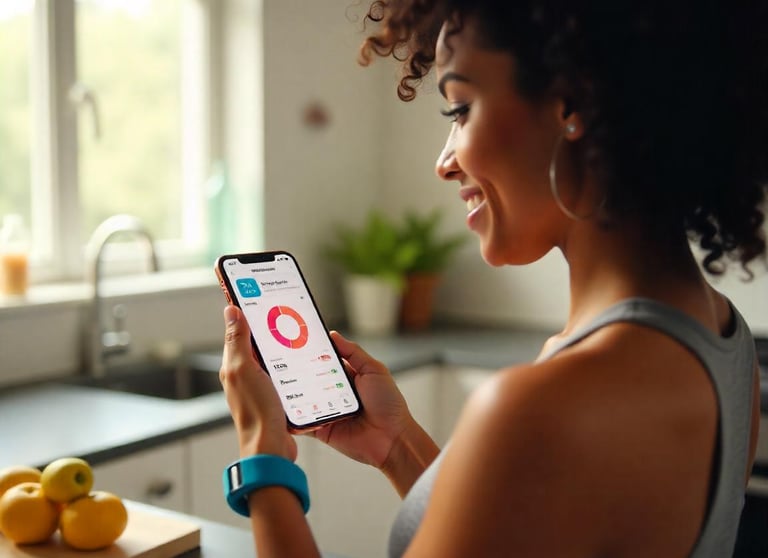Calorie Goals Explained: How to Track for Weight Loss Success
Confused about calorie tracking? Learn how to set realistic calorie goals and stick to them with app-based coaching support.
Loraine Berriman
7/15/20256 min read


Understanding calorie goals is the single most powerful tool for sustainable weight loss, yet it's often the most confusing. This article explains exactly how to set your personal calorie target and track your progress for long-term success. You've probably heard conflicting advice about whether you should count them, ignore them, or find some middle ground. The truth is, understanding calorie goals doesn't have to be complicated, and when done right, it becomes one of your most powerful tools for sustainable weight loss.
What Are Calorie Goals Really About?
Think of calorie goals as your personal energy budget. Just like managing your finances, you need to understand what's coming in versus what's going out. Your body burns calories constantly, even when you're sleeping, through basic functions like breathing and keeping your heart beating. Add in your daily activities, exercise, and digestion, and you get your total daily energy expenditure.
Here's where it gets practical: when you consistently consume fewer calories than you burn, you create what experts call a calorie deficit. This forces your body to tap into stored fat for energy, leading to weight loss. It's not magic, it's basic energy balance.
Setting Your Personal Calorie Target
Understanding Your Starting Point
Most people skip this crucial step and jump straight into restrictive dieting. Instead, start by calculating your baseline needs. A simple rule of thumb is multiplying your current weight by 15 if you're moderately active. This gives you a rough estimate of calories needed to maintain your current weight.
For example, if you weigh 160 pounds and get about 30 minutes of activity most days, you'd need roughly 2,400 calories daily to maintain your weight. From there, you can create a sustainable deficit.
The Sweet Spot for Weight Loss
Research consistently shows that a deficit of 500-750 calories per day leads to healthy, sustainable weight loss of 1-2 pounds per week. This might sound slow, but it's actually the goldilocks zone for keeping the weight off long-term.
Going too aggressively with your deficit often backfires. As one registered dietitian notes, "Extreme calorie restriction can cause the body to enter a starvation mode, slowing down metabolism and making it harder to lose weight in the long run."
The Psychology of Calorie Tracking
Why Tracking Works
There's solid science behind why tracking helps. When you log your food, you develop awareness of eating patterns you might not notice otherwise. That afternoon snack habit or weekend indulgences become visible, helping you make informed decisions rather than emotional ones.
One fascinating study found that people who consistently tracked their food intake had significantly better weight loss outcomes than those who didn't. It's not about perfection, it's about awareness.
Making It Less Overwhelming
The key is finding a tracking method that fits your lifestyle. Some people thrive on detailed app-based tracking, while others prefer simple pen-and-paper food diaries. The best method is the one you'll actually use consistently.
Start with tracking just one meal per day for a week. Once that becomes routine, add another meal. This gradual approach prevents the all-or-nothing mindset that derails many people.
Getting Support Along the Way
The Power of Accountability
Whether it's a friend, family member, or professional coach, having someone to share your progress with increases your chances of success. They can offer encouragement during tough moments and celebrate victories with you.
Professional Guidance
Consider working with a registered dietitian or certified nutritionist, especially if you have health conditions or have struggled with disordered eating in the past. They can help you create a personalized plan that fits your unique needs and lifestyle.
Your Next Steps
Start where you are, not where you think you should be. If you've never tracked calories before, begin with just logging everything you eat for one week without changing anything. This baseline gives you valuable information about your current habits.
The goal isn't perfection. It's progress. Every logged meal, every mindful choice, and every time you choose consistency over perfection brings you closer to your weight loss goals.
The most successful people aren't those who never make mistakes. They're the ones who view tracking as a tool for learning rather than judgment, and who adjust their approach based on what they discover about themselves along the way.
Further reading on TheFitnessEdit.co.za: 'How to Get the Most Out of Your Online Personal Trainer for Weight Loss.'
Key References:
Harvard Health: Calorie Counting Made Easy - Comprehensive guide to practical calorie calculation methods
National Institute of Health: Optimal Diet Strategies for Weight Loss - Evidence-based research on effective calorie deficit strategies
Academy of Nutrition and Dietetics: Healthy Weight Loss Guidelines - Professional recommendations for sustainable weight management
MUSC Health: Benefits of Tracking Food Intake - Research on food tracking effectiveness
Healthline: Best Weight Loss Apps 2024 - Technology tools for calorie tracking and weight management.
Modern Tools and Technology
App-Based Solutions
Today's calorie tracking apps have evolved far beyond simple calculators. Many now use AI to provide personalized guidance that adapts to your progress and preferences. These tools can scan barcodes, suggest portion sizes, and even predict your likely calorie needs based on your activity patterns.
The convenience factor can't be overstated. Having a tracking tool in your pocket means you can log meals in real-time, reducing the mental load of trying to remember everything later.
Finding Your Tracking Style
Consider your personality when choosing tools. Detail-oriented people might love comprehensive apps with macro tracking and meal planning features. If you prefer simplicity, basic calorie counting might be sufficient. Some prefer photo-based tracking, where you simply take pictures of your meals.
Common Calorie Tracking Mistakes
Setting Unrealistic Targets
The biggest mistake people make is setting calorie goals that are too aggressive. Dropping below 1,200 calories for women or 1,500 for men often leads to nutrient deficiencies, muscle loss, and metabolic slowdown. Your body needs adequate fuel to function properly.
Ignoring Food Quality
Not all calories are created equal. A 200-calorie candy bar affects your body differently than 200 calories of mixed nuts. While calories matter for weight loss, food quality impacts hunger, energy levels, and overall health.
All-or-Nothing Thinking
Many people abandon tracking after one "bad" day. Remember, weight loss happens over weeks and months, not individual days. One high-calorie day won't derail your progress if you get back on track.
Making Calorie Goals Sustainable
The Flexible Approach
Instead of rigid daily targets, think weekly averages. If you go over one day, you can adjust the next day or two. This flexibility helps you handle social events, travel, and life's unexpected moments without derailing your progress.
Building Habits Beyond Numbers
Use calorie tracking as a learning tool rather than a permanent crutch. Pay attention to which foods keep you satisfied longer, what portion sizes work for your body, and how different meals affect your energy levels.
Incorporating Regular Check-ins
Schedule weekly reviews of your tracking data. Look for patterns: Are you consistently hungry at certain times? Do you struggle more on weekends? This information helps you adjust your approach proactively.
When to Adjust Your Goals
Plateaus Are Normal
As you lose weight, your calorie needs decrease. A 65kg person burns fewer calories than a 80kg person doing the same activities. This means you may need to adjust your calorie goals every 4-7kg's lost.
Listening to Your Body
If you're constantly exhausted, irritable, or obsessing about food, your calorie deficit might be too aggressive. Sustainable weight loss should leave you feeling energized, not deprived.
The Maintenance Transition
Eventually, you'll reach your goal weight and need to shift from weight loss to maintenance calories. This transition often feels scary, but it's actually liberating. You've learned valuable skills about portion control and food choices that will serve you long-term.




The information provided in this blog post is intended solely for informational purposes. It is not meant to replace professional medical advice, diagnosis, or treatment. Consult health care providers for personalised medical advice and treatment options related to specific health concerns.
About The Author
Loraine is an International Personal Trainer certified through Trifocus Fitness Academy (South Africa). She believes fitness should be accessible to everyone, regardless of age or starting point, and focuses on creating programs that fit real lives, not the other way around.
© 2026 Elevate Wellness Co. Pty Ltd. All rights reserved


